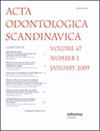Survival of endodontically treated teeth in public dental service in Northern Finland: a practise-based register study.
IF 1.4
4区 医学
Q3 DENTISTRY, ORAL SURGERY & MEDICINE
引用次数: 0
Abstract
OBJECTIVE The aim of this study was to explore the factors associated with the survival of root canal treated teeth in a practise-based study setting in a 5-year period. MATERIAL AND METHODS This retrospective study used data from the electronic patient registration system of the public dental services of the City of Oulu, Finland. The inclusion criteria for this study were patients aged ≥ 20 years who had root canal treatment (RCT) that was initiated in 2014. One RCT per patient was included in the study. A total of 713 patients met the inclusion criteria. The outcome variable for this study was the extraction of the RCT tooth during the 5-year period. Explanatory variables included age, diagnosis, tooth type (incisive, canine, premolar, molar), RCT technique (manual, motorized), time from RCT initiation to final restoration and type of final restoration (composite, glass ionomer, fixed dental prosthesis). To evaluate the association between the outcome variable and explanatory variables, Cox regression analyses were performed. RESULTS The overall survival rate was 91%. The middle-aged (40-59-years-old) and the oldest (60 and older) patients had a two-fold risk of extraction compared to younger (20-40-years-old) patients. Similarly, a short length of time from RCT initiation to final restoration (0-14 days) resulted in a nearly three times higher risk of extraction compared to a longer period (≥ 90 days). CONCLUSIONS The 5-year survival rate of RCTs seems high. Extractions were more common among patients over 40 years of age and if the RCT was completed shortly after its initiation.芬兰北部公共牙科服务中接受牙髓治疗牙齿的存活率:基于实践的登记研究。
材料与方法这项回顾性研究使用的数据来自芬兰奥卢市公共牙科服务机构的电子患者登记系统。本研究的纳入标准是年龄≥ 20 岁、在 2014 年开始接受根管治疗 (RCT) 的患者。每位患者接受一次根管治疗。共有 713 名患者符合纳入标准。本研究的结果变量为 5 年内 RCT 牙齿的拔除情况。解释性变量包括年龄、诊断、牙齿类型(切牙、犬齿、前磨牙、臼齿)、RCT 技术(手动、电动)、从开始 RCT 到最终修复的时间以及最终修复的类型(复合材料、玻璃离聚体、固定义齿)。为评估结果变量与解释变量之间的关联,进行了 Cox 回归分析。中年(40-59 岁)和老年(60 岁及以上)患者的拔牙风险是年轻(20-40 岁)患者的两倍。同样,从开始 RCT 到最终修复的时间短(0-14 天)与时间长(≥ 90 天)相比,拔牙风险高出近三倍。结论:RCT 的 5 年存活率似乎很高,但在 40 岁以上以及 RCT 开始后不久就完成的患者中,拔牙更为常见。
本文章由计算机程序翻译,如有差异,请以英文原文为准。
求助全文
约1分钟内获得全文
求助全文
来源期刊

Acta Odontologica Scandinavica
医学-牙科与口腔外科
CiteScore
4.00
自引率
5.00%
发文量
69
审稿时长
6-12 weeks
期刊介绍:
Acta Odontologica Scandinavica publishes papers conveying new knowledge within all areas of oral health and disease sciences.
 求助内容:
求助内容: 应助结果提醒方式:
应助结果提醒方式:


